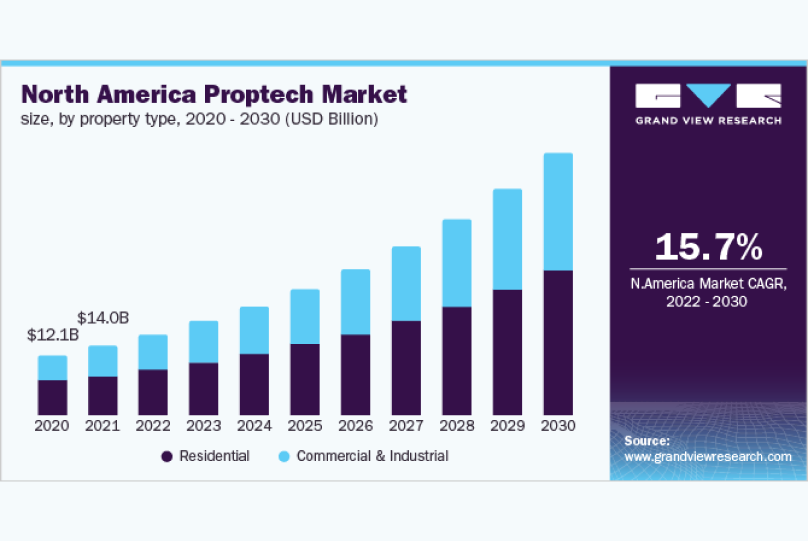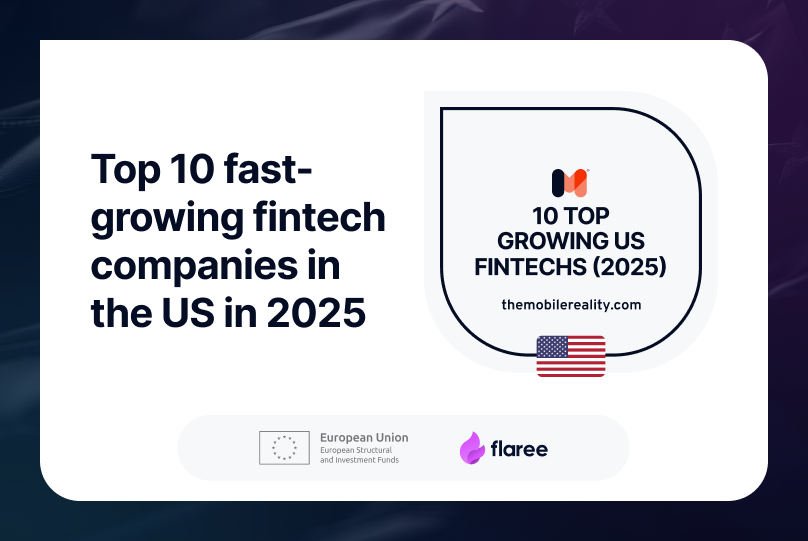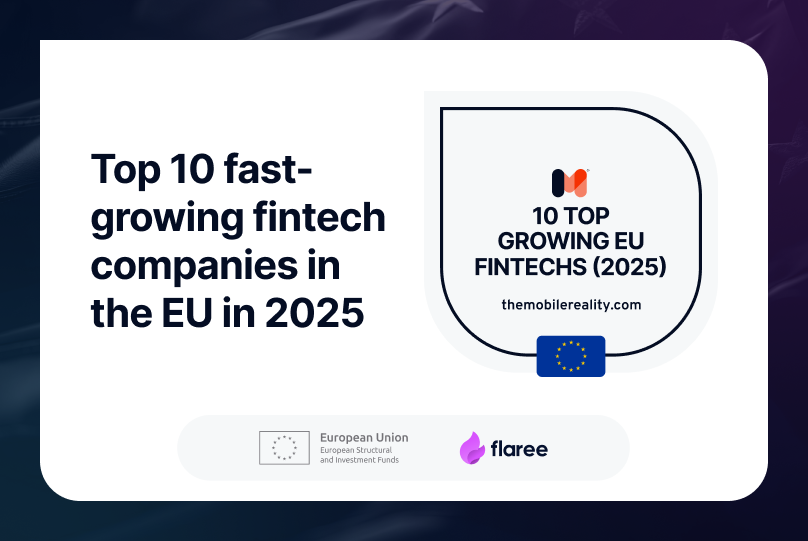Introduction
The real estate industry has seen a profound and revolutionary transformation in recent years, primarily attributed to the emergence and rapid advancement of property technologies, commonly known as proptech. Proptech meaning has disrupted traditional practices, reshaping the landscape and ushering in a new era of efficiency, transparency, and convenience.
In this digital age, proptech has become the catalyst for reshaping the entire real estate value chain. From property search to transaction management, proptech solutions have revolutionized how we buy, sell, rent, and manage properties. Homebuyers and investors now enjoy an unprecedented level of access to information, market trends, and property data, enabling more informed decisions and ultimately leading to better outcomes.
With proptech applications proliferating across the industry, real estate agents and agencies have adopted digital platforms and tools to streamline their operations and deliver enhanced customer experiences. These technologies not only streamline administrative tasks but also empower agents to reach a wider audience and tailor their services to individual client needs.
Moreover, proptech innovations have significantly impacted the property investment landscape. Real estate crowdfunding platforms have democratized access to investment opportunities, allowing a broader range of individuals to participate in real estate ventures that were once limited to wealthy investors. Additionally, blockchain technology has been leveraged to facilitate more secure and transparent property transactions, reducing fraud risks and enhancing trust among parties.
What is Proptech about?
The real estate industry has seen a significant transformation in recent years, thanks to the emergence of property technologies, commonly referred to as proptech. Proptech meaning refers to using technology to transform, streamline, and optimize how we buy, sell, rent, and manage the property and takes question as "what is proptech"
Proptech definition is an umbrella term that encompasses a wide range of technologies, including virtual reality, big data, blockchain, artificial intelligence, and the Internet of Things. These technologies are gradually disrupting the traditional real estate industry, making transacting property easier, faster, and cheaper.
Virtual reality is one of the most popular proptech applications. It enables potential buyers and renters to take virtual tours of properties from the comfort of their homes. This technology has revolutionized property viewing, making it more convenient and accessible.
Big data is another proptech application that is transforming the real estate industry. It enables property investors, developers, and agents to access and analyze vast data about properties, markets, and trends. This information is critical in making informed investment decisions, identifying emerging trends, and predicting future demand.
Blockchain is a decentralized ledger technology gaining popularity in the real estate industry. It enables secure, transparent, and efficient property transactions resistant to fraud, tampering, and corruption. Blockchain also offers the potential to remove intermediaries and reduce transaction costs, making property transactions more accessible and affordable.
Artificial intelligence is another proptech outlook application that is transforming the real estate industry. It enables property managers, agents, and investors to automate routine tasks like maintenance, repairs, and rent collection. AI also allows them to analyze data and make predictions, leading to better decision-making and improved profitability.
Finally, the Internet of Things (IoT) is a proptech outlook application transforming how we manage and maintain properties. IoT devices, such as smart thermostats, security cameras, and sensors, enable property managers to remotely monitor and control various aspects of a property. This technology improves property efficiency, reduces energy costs, and enhances safety.
In conclusion, property technologies are transforming the real estate industry, making it more efficient, accessible, and affordable. As these technologies evolve, we can expect a more democratized and transparent real estate industry and proptech meaning, where everyone has equal access to property opportunities.
How Proptech is revolutionizing real estate

Source: Grand View Research
Proptech has already had a significant impact on the real estate industry. For example, virtual reality has allowed buyers and renters to view properties from anywhere in the world. It saves time and money and makes the process more convenient and accessible.
Grand View Research report states that the global PropTech market size was valued at USD 25,145.1 million in 2021 and is expected to expand at a compound annual growth rate (CAGR) of 15.8% from 2022 to 2030. The growth is anticipated to be driven by the increasing adoption of several cutting-edge technologies, such as the Internet of Things (IoT), machine learning, artificial intelligence, and virtual reality, across the real estate industry. Additionally, adopting such technologies helps streamline data management and simplifies massive property management operations. Furthermore, AI helps in understanding and recommending client preferences. Artificial intelligence in the real estate meaning of a sector can help fine-tune advertising efforts by spotting trends and delivering actionable insights to clients and customers. The growth is expected to be driven by the increasing demand for property management software and asset management software.
Big data has also revolutionized the way we invest in real estate. By analyzing market data and trends, investors can make informed decisions about where to invest their money. It has led to a more efficient market where prices are based on data rather than speculation.
Blockchain can transform how we buy and sell property. By removing intermediaries and reducing transaction costs, blockchain technology can make property transactions more accessible and affordable. It also provides a secure and transparent way to transfer property ownership, reducing the risk of fraud and corruption.
Artificial intelligence is another promising area of proptech outlook. By automating routine tasks and analyzing data, AI can help property managers, agents, and investors make better decisions about their properties. For example, AI can predict future maintenance needs, identify areas where energy costs can be reduced, and help landlords to understand their tenants' preferences and behaviors better, allowing them to tailor their services accordingly. It has the potential to improve tenant satisfaction and retention rates.
Moreover, the Internet of Things (IoT) can help property owners and managers optimize their energy consumption and reduce their environmental footprint. Using intelligent sensors and devices, they can monitor and control electricity, heating, and cooling, among other things. It helps them save money on utility bills and contributes to the fight against climate change.
In addition, proptech definition can help address some of the long-standing issues in the real estate industry, such as lack of transparency, accessibility, and affordability. By leveraging technology, we can create a more open and inclusive market where everyone has equal access to property information, financing, and opportunities.
However, there are also some challenges and concerns associated with the adoption of proptech outlook. For instance, some experts worry about the potential loss of jobs and the impact on the role of intermediaries, such as real estate agents and brokers. Others raise concerns about data privacy, cybersecurity, and the ethical use of AI and other technologies.
Therefore, it is crucial to approach the development and implementation of proptech outlook with caution, ensuring that it benefits all stakeholders and does not create new problems or exacerbate existing ones. It requires collaboration among different actors, including policymakers, investors, entrepreneurs, and users.
Overall, property technologies have the potential to revolutionize the real estate industry, making it more efficient, accessible, and sustainable. By embracing innovation and collaboration, we can create a better future for real estate, where technology serves as a tool for positive change and progress.
The Future of Real Estate with Property Technologies
The real estate industry is ripe for innovation, and property technologies (proptech) are leading the way in transforming the industry. Prop tech refers to using technology to streamline and optimize various aspects of real estate, from buying and selling to renting and managing properties.
With the advent of proptech definition, the traditional real estate industry is gradually being disrupted, making property transactions more efficient, accessible, and affordable. Some of the most promising proptech outlook applications include virtual reality, big data, blockchain, artificial intelligence, and the Internet of Things.
Virtual reality has allowed buyers and renters to view properties remotely, saving time and money and making the process more convenient and accessible. Big data enables investors, developers, and agents to access and analyze vast amounts of data about properties, markets, and trends, leading to better investment decisions.
Blockchain technology offers secure and transparent property transactions resistant to fraud and corruption. It also has the potential to reduce transaction costs and remove intermediaries, making property transactions more accessible and affordable.
Artificial intelligence can help property managers, agents, and investors automate routine tasks, analyze data, and make informed decisions about their properties. The Internet of Things (IoT) enables property owners and managers to monitor and control various aspects of properties remotely, improving efficiency, reducing energy costs, and enhancing safety.
By leveraging these technologies, the real estate industry can become more democratized and transparent, where everyone has equal access to property opportunities. However, some challenges and concerns come with the adoption of proptech definition.
Some experts worry about the potential loss of jobs and the impact on intermediaries, such as real estate agents and brokers. Others raise concerns about data privacy, cybersecurity, and the ethical use of AI and other technologies. Therefore, it is crucial to approach the development and implementation of proptech outlook with caution, ensuring that it benefits all stakeholders and does not create new problems or exacerbate existing ones.
We expect to see more innovative proptech outlook solutions transform the real estate industry's different story. For instance, we may see more widespread use of virtual and augmented reality in property transactions, allowing buyers and renters to experience properties more immersively.
We may also see the increased use of machine learning and predictive analytics to improve decision-making in real estate investments. In addition, we may see the emergence of more sustainable and environmentally friendly proptech outlook solutions as the industry becomes more conscious of its environmental impact.
Conclusion
In conclusion, the realm of property technologies, commonly referred to as proptech definition, is orchestrating a profound metamorphosis within the real estate industry. This revolutionary wave of innovations, encompassing everything from cutting-edge applications to novel digital platforms, is ushering in an era of unprecedented efficiency, heightened accessibility, and enhanced sustainability.
The question of "what is prop tech" has evolved from a mere query into a clarion call for transformation. It encapsulates the dynamic fusion of property and technology, embodying a proptech definition that extends beyond conventional boundaries. This prop tech revolution is not merely a fleeting trend but a resounding proptech outlook that envisions a future where the real estate landscape thrives on innovation and synergy.
As we delve deeper into the prop tech meaning and a question "what is proptech", we realize that its essence lies in reshaping the traditional paradigms of real estate. With each stride taken in the direction of proptech definition, we are paving the way for a more accessible and inclusive real estate ecosystem, transcending barriers that once seemed insurmountable.
In this context, fostering an environment of collaborative exploration becomes pivotal. By embracing proptech outlook as a catalyst for positive change, we forge a path towards progress that unites industry stakeholders, entrepreneurs, and visionaries alike. Through collective efforts, we can sculpt a brighter future for real estate—a future where the transformative potential of proptech definition is fully harnessed to elevate our communities and elevate the human experience.
In sum, proptech outlook is not just a buzzword; a question "what is proptech" it's a driving force that propels us towards a future where real estate redefines its possibilities. The prop tech revolution stands as a testament to human ingenuity, reimagining the landscape and reshaping the very fabric of how we interact with spaces. As we continue to unravel its intricacies, let us embrace the proptech meaning and champion its cause, ensuring that technology becomes an unwavering tool for constructive change, ushering in a new era of prosperity and progress for the real estate industry.
Proptech and Real Estate Software Development Insights
Are you interested in the dynamic intersection of property technology and real estate software development? At Mobile Reality, our expertise in proptech is deep and broad, covering a range of innovative solutions and industry trends. We tackle unique challenges and employ cutting-edge strategies to advance real estate technology. Our selection of in-depth articles provides a comprehensive overview of the latest developments in proptech and real estate software:
- Software for real estate that you should consider in 2025
- Next Generation Property Management Solutions
- Commercial real estate problems in 2024
- Top Proptech Conferences That You Cannot Miss in 2025
- Top Proptech Trends Shaping the Future
- How AI is Reshaping Real Estate Markets
- Build a Top-Notch Real Estate App with Ease
- Real Estate Software Integration: guide for proptech teams
- AI Property Management: Instant, Cited Answers for Tenants
Dive into these informative resources to enhance your understanding of the proptech sector. Please contact our sales team if you're considering collaborating in proptech or real estate software development. And for those interested in joining our pioneering team, visit our careers page and submit your CV. Join us in shaping the future of proptech and real estate software development!





